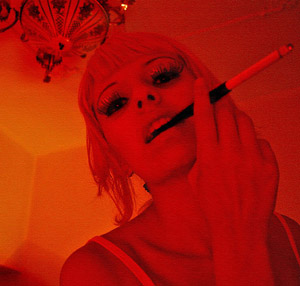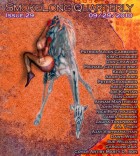“Working Halloween for Christmas Money” is, despite the unexpected setting, a realistic workplace narrative, but its structure is unexpected. You teach creative writing, so you know what would happen to this story in a workshop. Got something to say about that?
You realize by framing the question this way, you are inviting me to talk like a teacher?
A story is only as good as its ending. There are some editors I really respect who turned down this story because of its ending. I had a hunch, ironically, that because you were a teacher too, this ending just might get to you. If I walk out on thin ice alone, that’s one thing. You see my mistake. But if I take you there too, then we both feel it, and the story has done something powerful.
One of my first breakthroughs as a writer was when I wrote something that I knew was hitting all the right notes but also went somewhere unexpected. Mary Robison didn’t like my ending. She understood and respected what I had done but felt it was the wrong aesthetic choice. Mary Robison is one of the best writers in English alive or dead, and
I knew then, when I was in my twenties, that I had my ending and I wasn’t going to change it. We learn “rules” in workshop to get readers comfortable with us as writers, but we also become artists in workshop, and that’s a lot harder to pin down or talk about. And artists tend to disagree.
To be honest, the initial power of the story for me is entirely personal–I’ve never made it through a haunted house, so I’m reading for revelation. Do you know what you’re talking about?
So you are questioning my authority? I’ve been in haunted houses, but not the type where people chase you around. Mostly my experience is with the kind at county fairs: converted trailers that beckon the whole night with a really loud sound track, and you pay to walk through a maze in the dark. For the story, YouTube was helpful. One can take a tour of the type of haunted house I intended, and that way not have to interact with any of the humans. I think the scary part is that someone might take the role too seriously.
But the impetus for the story was that someone offered me a job at one. I was flabbergasted that wearing make-up and chasing kids would be seen as a revenue stream. There’s a kind of built-in pathos to the point of view and I carried that setting as a story-possibility around for years, knowing I had to figure out a way to write about it. I’ve always been able to arrange my teaching so I don’t have to drive to campus every day, and that allows me to get writing done two or three mornings per week. Halfway to full-time writer is probably as good as most of us can hope for. Anyway, a neighbor seemed to think I wasn’t working and so he thought this offer was helping me out. I’m someone who can move around in all kinds of circles and I think people see in me what they want to see. What I remember him telling me about this job was that you had to be there every weekend or you didn’t get paid. It was all or nothing and at the end of the season the pot was divvied up. It seemed like an oppressive exploitative work atmosphere to me, though this person and their spouse seemed to think it was a hoot and a great way to earn a little extra. One weekend my wife and I babysat their daughter so they could go do this. They didn’t tell us she was sick when they dropped her off and the kid, who was too young to know what was going on, was uncomfortable and very upset well into the night. We didn’t threaten to take the kid to the emergency room, but we kept calling these people to beg them to come home and comfort their kid. They didn’t want to leave the haunted house because they were afraid they’d lose all the work they’d put in and wouldn’t get paid. I guess I’m a communist, but I firmly believe people shouldn’t ever have to make those kinds of decisions. The folks out there who are vocal about what should and shouldn’t be done tend to put all the blame on the parents. But they were doing this as a way of trying to provide. It was fun to write characters in costumes, but this other stuff, the painful stuff, is where I wanted to go.
Gee whiz John, you’ve had a heck of a year so far. How does what we’ve seen align with what you see as your development? Or to put it another way, talk about the most recent changes in your writing.
I’ve had a Laura Ellen Scott kind of year. I wish I could do emoticons in this interview so everyone would know I’m jokingly serious.
The biggest change is that I woke up and realized there was an Internet.
Three things happened that brought me to this spate of recent online publications. My good friend, Jurgen Fauth, started Fictionaut, and my eyes were opened to a lot of writers who were publishing all over the place on the Web.
The second thing that happened was that I got an iPhone. This little device has liberated me from the desk and the laptop. I don’t have to read online magazines from a computer, and my online reading has increased one hundred fold. One of the reasons I was asleep to what was going on on the Internet was that when I had time to sit at the computer, I was writing. And if I had worked all day and wanted to do some reading, I didn’t want to stare at a screen.
The last piece of all this coming together for me was that I had the material. Some of what has come out in recent months was written twelve or thirteen years ago, but it didn’t get into magazines because I would submit stuff for a year or so and give up. All the mags were university-related, and those folks are still around, and still as hard as ever to crack. But now the submission process is easier, and speedier, and free. And the tastes of the editors are more varied. Some of the pieces are morsels from the novels. And then I’ve also been more focused on writing shorter work. Because I’ve been reading very short work and I’ve been immersed in it, of course I would want to try to write more.
Maybe what you are asking has to do with how the choices I’ve made in the stories have changed. I guess the idea of taking risks has always been there. The nice thing about the Internet is that the risk-taking seems to be more universally appreciated and rewarded.
Describe life in a two-writer household.
For folks who know we are both writers, maybe it seems like this ideal home-life where we sit around and make art all weekend. I suppose it can be like that. But work, housework, the needs of our son, they all intrude. And so the time to read, the time to write, they have become a lot more valuable and harder to get to. Steve Barthelme once gave a class the advice that if we wanted to keep writing we should go get a sugar daddy. So writing is a class thing. Lots and lots of well-off kids have been able to luxuriate in the writing life. I don’t begrudge them this. Often, they are wonderful human beings with a balanced view of the world and the world is a better place because of the work they’ve put out. But income versus leisure, it can be limiting.
I’ve had jobs where I didn’t have the energy to write when I got home. And there were times when I went ahead and did the writing anyway. It comes out of you physically, and as you get older it’s harder to do that. I prefer a morning session and that’s really a luxury compared to all the other adults who have to get up and work every day. Luckily, I’m not asking my family to scrimp too much, and luckily, my wife wants the same thing. We can say to the other, I have this thing I’m working on, you need to watch the boy.
My wife edits my work. I respond to hers. We have different strengths but I think we influence and inspire each other. Thankfully, we don’t get competitive with the writing and it’s a part of our relationship that seems, I don’t know how else to characterize it, “professional.” I mean, it’s also personal, she knows the seeds of my stories, and how the endings have changed, for example. So we really respect each other’s talent and are proud of each other’s work. The only bad side I see is that if she has a story I don’t like, or if she tells me, very nicely, that a story of mine doesn’t do it for her, then these stories tend not to get sent out. And there can be a deeper sense of disappointment when this special person doesn’t give approval.
As far as our son goes, I don’t think there’s any parent who isn’t slightly beaten down by the time a child takes, but who’s also willing to make that sacrifice. As fiction writers, it’s part of our job to try to characterize the depth of human relationships. Having a child takes things to the next level. It’s cliché but the way you love a child is overwhelming. I also get to watch his intellect grow through language acquisition. It’s really remarkable.



 The core workshop of SmokeLong Fitness is all in writing, so you can take part from anywhere at anytime. We are excited about creating a supportive, consistent and structured environment for flash writers to work on their craft in a community. We are thrilled and proud to say that our workshop participants have won, placed, or been listed in every major flash competition. Community works.
The core workshop of SmokeLong Fitness is all in writing, so you can take part from anywhere at anytime. We are excited about creating a supportive, consistent and structured environment for flash writers to work on their craft in a community. We are thrilled and proud to say that our workshop participants have won, placed, or been listed in every major flash competition. Community works.